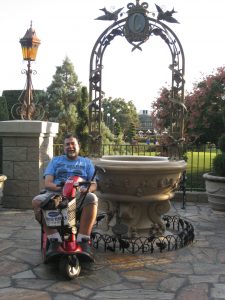ALS Awareness Month- Never Lose Hope

“You don’t lose hope, love. If you lose hope, you lose everything.” – Mrs Potts , Belle’s Magical World
ALS Awareness month comes to a close today, but patients, caregivers and loved ones of those with ALS continue to live with the physical and emotional effects of the disease. August will mark two years since Ben left this world, free from his struggle with the disease. I want to conclude this month by offering this wisdom from Mrs. Potts of Beauty and the Beast fame.
I have written often about Ben’s bravery and persistence. It has taken me a long time to come to understand that I was brave in a different way. And, I can honestly say that hope played a tremendous part in our lives. There was hope that things would get better and we would find innovative ways to help him eat, use his electronics, and maintain a good quality of life. There was hope that the next day would be less stressful. There was hope that each day would have some smiles and laughs. There was hope that I would remain patient. There was hope that Ben would accept that his needs were increasing. There was hope that he would have more time. There was hope that the disease would progress slowly. There was hope that he would transition peacefully.
Was it naïve to hope? Was it like my tossing coins in Cinderella’s Wishing Well? I don’t think so. To wish is to hope, and I have often written about wishes on this blog. Hope allowed me to reach for optimism. It allowed me to see the positive things, even if the big picture was not good. It allowed me to recognize and be relieved and content that one day was better than the prior one, not because the ALS was getting better or going away, but maybe because we were in better moods or successfully solved a problem. Hope allowed me to fantasize in a healthy way, remembering wonderful times and trying to recreate those and create new ones. It allowed me to be a creative thinker. It allowed me to smile, even through tears.
Hope was my pixie dust. Because I had hope, I was able to open my mind to finding ways to help Ben and to help myself. Hoping beyond hope that Ben would transition peacefully gave me the mindset to work towards making that happen. Love let me cope with the moments when hope was waning.
Hope also has helped me get through grief. It has allowed me to envision a positive future without Ben but with love. It allows me to seek opportunities to help others who are dealing with ALS.
I still have hope and I do make wishes. I hope that I always honor Ben’s memory in a way that he would appreciate. I hope that my blog and interactions with people affected by ALS will help and comfort them. I hope that I will find love again. I hope beyond measure that a cure will be found for this horrible disease.
In a way, hope is a gift, because it allows you to escape some harsh realities. I hope that all of my readers who are affected by ALS will find ways that inspire you to be hopeful and to see past the dark clouds to clear your mind, if only temporarily. There are reasons to be hopeful as we look at the research being done. There is also hope for comfort and the future as we look at the communities and forums of supportive and caring people that connect us because we share a deep bond of understanding and empathy.
Yes, ALS Awareness Month is ending. But, I hope that the determination never wanes to continue to raise awareness of ALS and the brave battles fought by people like my Ben.
I agree with Mrs. Potts. If you lose hope, you lose everything.

2011- A visit to the Wishing Well at Cinderella’s Castle to wish for a cure for ALS.











